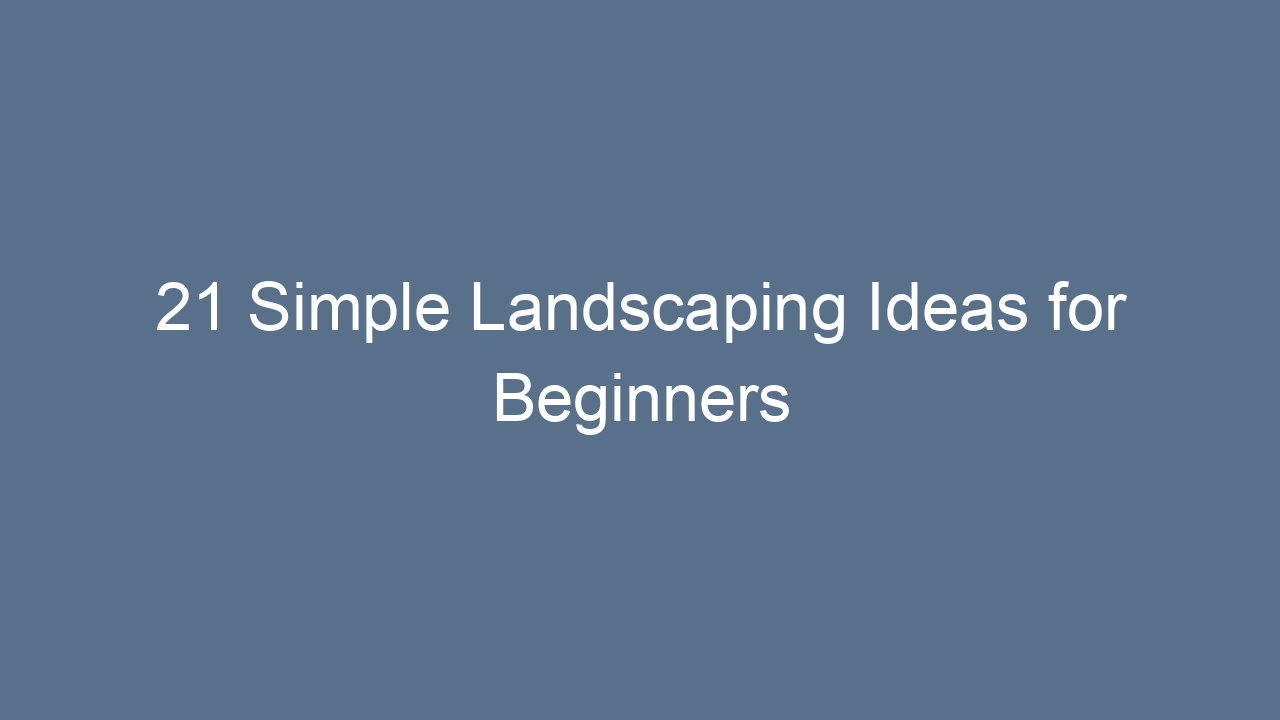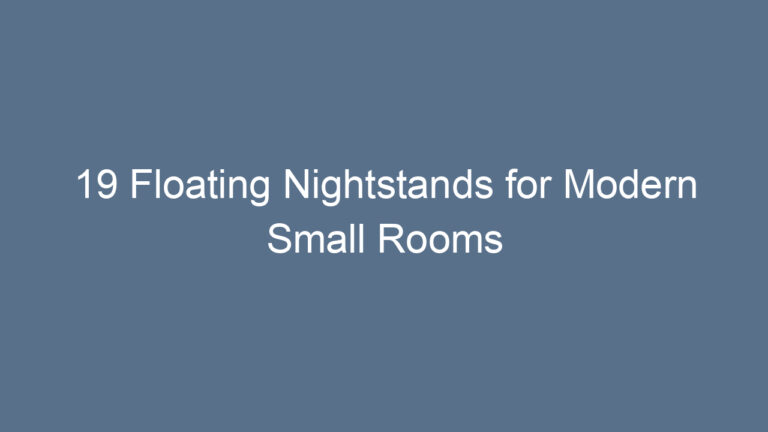21 Simple Landscaping Ideas for Beginners

Landscaping your yard can feel like trying to solve a puzzle when you don’t know where to start. If you’re a beginner, the idea of redesigning your outdoor space might seem overwhelming. But it doesn’t have to be! With a few simple steps and creative ideas, you can transform your yard into a beautiful, inviting place without breaking the bank or needing a degree in horticulture. Think of landscaping like painting a blank canvas—each plant, path, and decoration adds a splash of color and personality. In this article, I’ll share 21 simple landscaping ideas for beginners that are easy to do, budget-friendly, and fun. Whether you want to add curb appeal, create a cozy nook, or simply bring nature closer, these tips will help you get started confidently.
In This Article
- 1 1. Start with a Clean Slate
- 2 2. Use Mulch to Tie It All Together
- 3 3. Define Spaces with Pathways
- 4 4. Plant Native Species
- 5 5. Add a Focal Point
- 6 6. Keep Lawn Areas Manageable
- 7 7. Use Raised Garden Beds
- 8 8. Incorporate Container Plants
- 9 9. Mix Different Plant Heights
- 10 10. Use Outdoor Lighting
- 11 11. Create a Seating Area
- 12 12. Plant Edibles
- 13 13. Use Gravel for Low-Maintenance Zones
- 14 14. Introduce Vertical Gardens
- 15 15. Add a Water Feature
- 16 16. Use Recycled Materials
- 17 17. Plant Seasonal Flowers
- 18 18. Create Shade with Trees or Pergolas
- 19 19. Use Decorative Rocks
- 20 20. Build a Fire Pit
- 21 21. Plan for Easy Maintenance
- 22 Quick Summary: Beginner Landscaping Ideas Table
1. Start with a Clean Slate
Before planting or placing any new features, clear out debris, dead plants, and weeds. A tidy space gives you a fresh canvas to work on and helps you see the real shape of your yard. It’s like clearing your desk before starting a new project — everything feels more manageable. Removing old clutter also prevents pests and creates a healthy environment for new plants.
2. Use Mulch to Tie It All Together
Mulch isn’t just for looks; it protects soil, keeps moisture in, and keeps weeds out. Applying a fresh layer around plants and garden beds gives your yard a neat, finished feel. Plus, mulch is one of the easiest landscaping tricks for beginners because it requires little skill but adds instant polish.
3. Define Spaces with Pathways
Simple stone or gravel pathways can add structure and guide visitors through your yard. Think of pathways as the veins of your garden—they connect different areas and invite people to explore. You don’t need fancy materials; even stepping stones from the hardware store create a welcoming walkway.
4. Plant Native Species
Native plants are the superheroes of landscaping because they thrive with less water and maintenance. They attract local birds and butterflies too. Choosing native flowers, shrubs, and grasses means you spend less time worrying about watering and more time enjoying your garden’s natural charm.
5. Add a Focal Point
Every good landscape needs a star. It could be a bench, a birdbath, or a small tree. This focal point draws the eye and gives your space personality. I once added a simple wooden bench under a blooming cherry tree, and suddenly, the whole yard felt like a peaceful retreat.
6. Keep Lawn Areas Manageable
Lawns look great but can be a chore if they’re huge. For beginners, focus on smaller patches or replace some grass with ground covers like clover or moss that need less mowing and watering. This saves time and creates a more eco-friendly yard.
7. Use Raised Garden Beds
Raised beds are beginner-friendly because they offer good soil control and reduce back strain while planting or weeding. Plus, they add height and dimension to your landscape, breaking up flat spaces in an eye-pleasing way.
8. Incorporate Container Plants
Containers allow you to experiment without commitment. You can move pots around to find the perfect sunny or shady spot. Plus, containers let you add color or texture to patios, decks, and doorsteps easily.
9. Mix Different Plant Heights
Layering plants by height adds depth and interest. Tall plants at the back, medium in the middle, and low ground covers up front create a natural, flowing look. It’s like arranging furniture in a room — balance and flow make it comfortable.
10. Use Outdoor Lighting
Simple solar lights along pathways or string lights in trees add warmth and make your yard usable after dark. Lighting is the magic ingredient that turns an ordinary garden into a cozy evening escape.
11. Create a Seating Area
You don’t need fancy furniture. Even a couple of chairs or a hammock can make your yard inviting. I recommend picking a shaded spot or adding an umbrella for comfort during sunny days.
12. Plant Edibles
Imagine stepping outside to pick fresh herbs or vegetables! Edible plants like basil, tomatoes, or strawberries are easy to grow and double as decoration. Plus, they add a personal, rewarding touch to your landscaping.
13. Use Gravel for Low-Maintenance Zones
Gravel areas reduce grass growth and are perfect for seating or fire pits. It’s a simple way to add texture and reduce upkeep. You’ll love how low effort it feels compared to mowing.
14. Introduce Vertical Gardens
For small yards or patios, vertical gardens using trellises or wall-mounted planters save space and add greenery where you might not expect it. It’s like turning your fence into a living painting.
15. Add a Water Feature
A small fountain or birdbath adds soothing sounds and attracts wildlife. Water features don’t have to be grand — even a bowl with floating candles can bring tranquility.
16. Use Recycled Materials
Repurpose old bricks, wood pallets, or stones to create garden borders, planters, or paths. It’s a creative, eco-friendly way to add character without spending a lot.
17. Plant Seasonal Flowers
Changing flowers with the seasons keeps your garden looking fresh year-round. Annuals like marigolds or pansies add bright pops of color that lift spirits.
18. Create Shade with Trees or Pergolas
Planting a tree or installing a pergola can make your yard more comfortable in the summer. Shade not only cools your space but can help protect delicate plants.
19. Use Decorative Rocks
Rocks add natural beauty and contrast. A few well-placed stones can create mini rock gardens or accent beds. They’re low maintenance and last forever.
20. Build a Fire Pit
A fire pit creates a social hub in your yard. You can build one yourself with stones or buy a simple portable model. Nothing beats cozying up with friends and family outdoors.
21. Plan for Easy Maintenance
Finally, always think about upkeep when landscaping. Choose plants that suit your climate, and avoid complex designs that demand daily attention. The best landscaping lets you enjoy nature without stress.
Quick Summary: Beginner Landscaping Ideas Table
| Idea # | Idea Name | Why It’s Great for Beginners | Key Benefit |
|---|---|---|---|
| 1 | Clean Slate | Clears space to start fresh | Easy and essential |
| 2 | Mulch | Protects plants and adds neatness | Low effort, high impact |
| 3 | Pathways | Defines garden flow | Adds structure and interest |
| 4 | Native Plants | Low maintenance, eco-friendly | Saves water and effort |
| 5 | Focal Point | Adds personality | Creates visual focus |
| 6 | Manageable Lawns | Reduces mowing and watering | Saves time |
| 7 | Raised Beds | Easier planting and soil control | More accessible gardening |
| 8 | Container Plants | Portable and versatile | Flexibility in placement |
| 9 | Plant Heights | Adds depth | Natural look |
| 10 | Outdoor Lighting | Extends usability of garden | Creates ambiance |
| 11 | Seating Area | Invites relaxation | Comfort outdoors |
| 12 | Edibles | Functional and decorative | Fresh produce at home |
| 13 | Gravel Zones | Low maintenance areas | Less mowing |
| 14 | Vertical Gardens | Space-saving greenery | Good for small yards |
| 15 | Water Features | Adds tranquility | Attracts wildlife |
| 16 | Recycled Materials | Cost-effective creativity | Eco-friendly design |
| 17 | Seasonal Flowers | Keeps garden colorful year-round | Visual interest |
| 18 | Shade Solutions | Comfort and plant protection | Cooler spaces |
| 19 | Decorative Rocks | Adds texture and contrast | Durable and low maintenance |
| 20 | Fire Pit | Creates a social space | Cozy atmosphere |
| 21 | Easy Maintenance | Sustainable landscaping | Stress-free enjoyment |
Landscaping is a journey. Start small, experiment, and enjoy the process. Your yard will grow with you, reflecting your tastes and lifestyle. Don’t hesitate to make mistakes—sometimes a crooked path or a wild patch of flowers is the most charming part. These 21 simple landscaping ideas for beginners are your stepping stones to a beautiful outdoor haven, one easy step at a time. So grab your gloves and shovel, and get ready to make your garden your favorite room of the house!






